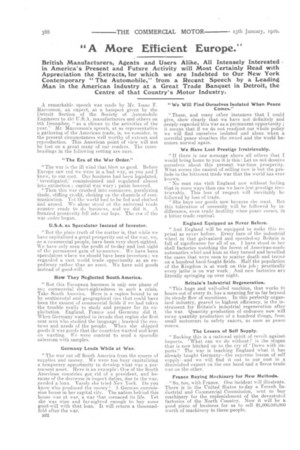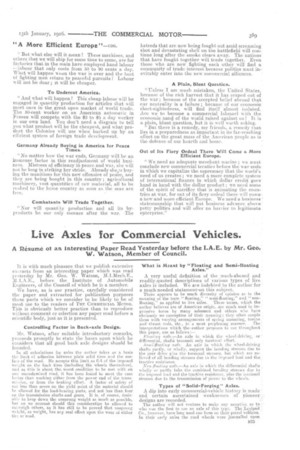"A More Efficient Europe."
Page 4

Page 5

If you've noticed an error in this article please click here to report it so we can fix it.
British Manufacturers, Agents and Users Alike, All Intensely Interestedin America's Present and Future Activity will Most Certainly Read with Appreciation the Extracts, for which we are Indebted to Our New York Contemporary "The Automobile," from a Recent Speech by a Leading Man in the American Industry at a Great Trade Banquet in Detroit, the
Centre of that Country's Motor Industry.
A remarkable speech was made by Mr. Isaac F. Marcoss-on, an expert, at a banquet given by the Detroit Section of the Society of Automobile Engineers to 450 U.S.A. manufacturers and others on 9th December, "as a climax to the activities of the year." Mr. Marcosson's speech, at so representative a gathering of the American trade, is, we consider, in the present circumstances well worthy of extract and reproduction. This American peint of view will not be lost on a great many of our readers. The crossheadings in. the following setting are ours.
"The Era of the War Order." .
"The war is the ill wind that bIew, us good. Before Europe saw red we were in a, bad way, as you and I knew, to our cost. Our business had been legislated, investigated,' commissioned and regulated almost into extinction ; capital was wary ; panic hovered. .4.` Then this war crashed into commerce, paralyzing trade, stifling credit, choking up the channels of communication. Yet the world had to be fed and clothed and armed. We alone stood at the universal trade counter ready to do business, and we did it-. A frenzied prosperity fell into our laps. The era of the war order began.
U.S.A. as Speculator Instead of Investor.
." But the plain truth of the matter is, thatwhile we lave capitalized a great prosperity out of the war, we, -as a commercial people, have been very short-sighted. We have only seen the profit of to-day and lost, sight of -the permanent gain of to-morrow. We have been -speculators where we should have been investors; we regarded a, vast world trade opportunity as an expediency rather than an asset. We have sold goods instead of good-will.
How They Neglected South America.
" But this European business is only one phase of oul. commercial short-sightedness in such a crisis. Take South America. were is a region bound to us by sentimental and geographical tie-s that could have been the easiest of commercial fields if we had taken the trouble really to study and prepare for its exploitation. England. France and Germany did it. When Germany wanted to invade that region she first sent men who studied the language ; learned the customs and needs of the people. When she shipped goods it was goods that the countries wanted and kept on wanting. We were content to send a sporadic salesman with samples.
Germany Lends While at War.
" The war cut off South America from the source of supplies and money.. We were too busy capitalizing
temporary opportunity to develop what. was a permanent asset. Here is an example : One of the South American countries got rid of a president, and beeause of the decrease in import duties, due to the war, needed a loan. Vainly she tried New York. Do you know who produced the money? A German commission house in her ca-pit-al city. The nation behind this house was at war, a war that menaced its life. Yet she was wise and far-sighted enough to -buy some gOod-will with that loan.It will -return a thousandfold after the war. '
B22 "We Will Find Ourselves Isolated When Peace Comes."
"These, and many other instances that I could give, show clearly that we have not definitely and deeply regarded this war as a permanent opportunity ; it means that if we do not readjust our whole policy we will find ourselves isolated and alone when a merciful peace sheathes the Sword and the world becomes normal again.
We Have Lost Prestige Irretrievably.
"If them is one message above. all others that would bring home to you it is this: Let us not deceive ourselves about this present war-time prosperity. What seems the easiest of selling now is but the prelude to the bitterest trade war that the world has ever known.
"No man can visit England now without feeling that in more ways than one we have lost prestige irretrievably. This loss of respect will inevitably be followed by loss of trade.
" She buys our goods now because she must. But this toleration of necessity will be followed by indifference, even trade hostility when peace comes, in a bitter trade reprisal.
England Equipped as Never Before.
"And England will be equipped to make this reprisal as never before. Every turn of the industrial wheel in that galvanized and speeded-up Britain is full of significance for all of -us. I have stood in her shell factories watching the forest of American-made automatics whirl and hum as they turned and bevelled the cases that were soon to scatter death and terror on a hundrod hard-fought fields. Half the population of the Kingdom is at work on this job ; practically every lathe is on war work. And new factories are literally springing up over night.
Britain's Industrial Regeneration.
"This huge and well-oiled machine, that works .21 hours out of every 2,4, has a meaning for us far beyond its steady flow of munitions. In this perfectly organized industry, geared tohighest efficiency, is the instrument for Britain's industrial regeneration after the war. Quantity production of ordnance now will mean quantity production of a hundred things, from small motorcars to safety razors, as soon as peace comes.
• The Lesson of Self Supply.
" Backing this is a national Spirit of revolt against imports. What can we do without?' is the slogan that is now hitched up to the cry of 'Down with im ports!' The war is teaching England what it has already taught Germany—the supreme lesson of self supply-and we will find it out to our cost in a diminished export on the one hand and a fierce trade war on the other.
France Buying Machinery for New Methods.
"So, too, with France. One incident will illustrate. There is in the United States to-day a French Industrial and Commercial Commission, sent to buy machinery for the replenishment of the devastated factories of the North Country. Now it will be a, good piece. of business for us to sell $1,000,000,000 worth of machinery to these people.
" But what else will it mean? These machines, and others that we will ship for some time to come, are for factories that in the main have employed hand labour —labour that only costs from 50 to 80 cents a day. What will happen utien the war is over and the host ar fighting men return to peaceful pursuits? Labour will not be dear ; it will be cheaper.
To Undercut America.
And what will happen? This cheap labour will be engaged in quantity production for articles that will meet ours in the great open market of world: trade. The 50-cent worker on an American automatic in France will compete with the $3 to $5 a day worker in our own land. You don't need a diagram to tell you what product will be the cheapest, and what product the Colonies will use when backed up by an efficient system of foreign trade development.
Germany Already Buying in America for Peace
Times
" No matter how the war ends, Germany will be an immense factor in this readjustment of world business. Mistress of efficiency in peace and war, she will not be long in striking her stride. Already she,is buying the munitions for this new offensive of pedee and they are being bought in this country ; agricultural machinery, vast quantities of raw material, all to be rushed to the home country as soon as the seas are free.
Combatants Will Trade Together.
"Nor will quantity production and all its byproducts be our only menace after the war. The
hatreds that are now being fought out amid screaming shot and devastating shell on the battlefield will continue long after the smoke clears away. The nations. that have fought together will trade togethei. Even those who are now fighting each other will find acommunity of trade interest because politics must inevitably enter into the new commercial alliances.
A Plain, Blunt Question.
"'Unless I am much mistaken, the United States,because of the rich harvest that it has reaped out of the war ; because of the accepted belief abroad that our neutrality is a failure ; because of our economic short-sightedness, will find itself almost isolated. , Are we to become a commercial Ishmael with the economic nand of the world. raised against us ? It is a plain, blunt question, but it is well worth asking. " But there is a remedy, my friends, a remedy that lies in a preparedness as important in its far-reaching: effect on the great mass of the American people as is the defence, of our hearth and home.
Out of Its Fiery Ordeal There Will Come a More Efficient Europe.
" We need an adequate merchant marine ; we must. conclude new commercial treaties before the war ends. in vidlich we capitalize the supremacy that the world's need of us creates ; we need a more complete system of international finance in which dollar credit goes' hand in hand with the dollar product ; we need some of the spirit of sacrifice that is animating the coun-: tries at war, for out of its fiery ordeal there will come a new and more efficient EuroPe. We need a business statesmanship that will put business athance above' petty politics and will offer no barrier to legitimate enterp rise."




















